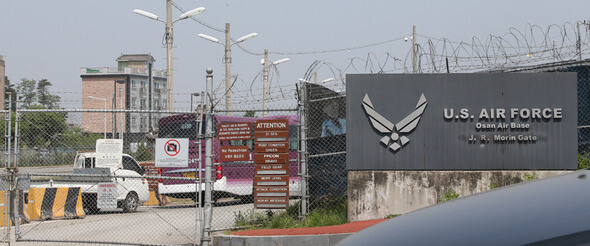hankyoreh
Links to other country sites 다른 나라 사이트 링크
Questions remain over extent of US anthrax use in South Korea

As soon as the facts about the delivery of live anthrax were revealed, the US military rolled into action, with US Defense Secretary Ashton Carter making an apology this past weekend and promising to discipline those responsible and to take measures to prevent this from reoccurring.
The prompt measures appear to have been motivated by concerns that the reports could trigger anti-American sentiment in South Korea, as when two middle school students were crushed by a US military armored vehicle during exercises in 2002.
However, a document by Peter Emanuel, biosciences division chief for the US Army Edgewood Chemical Biological Center (ECBC), raises doubts about the credibility of the US military’s position. Speaking about the anthrax incident on May 29, the US military said that this was the first time that such an experiment had been conducted.
But the document by Emanuel suggests that the JUPITR Program (Joint USFK Portal and Integrated Threat Recognition) may have already been initiated in 2013. In addition, this document raises the possibility that US military experiments designed to counter biological warfare may have involved botulinum, a toxin that is up to 10,000 times more deadly than anthrax.
Since the report, South Korea and the US have reportedly convened a subcommittee under SOFA (Status of Forces Agreement) to discuss measures for preventing such an incident from reoccurring.
“The US is well aware of the severity of this incident,” a South Korean government official said. “It is joining discussions in the disease prevention and control subcommittee, which is part of the SOFA joint committee. The joint committee will meet in July to take corrective measures.”
In regard to Article 9 of SOFA, the section dealing with tariffs and customs that exempts military goods en route to the US military from customs inspections, the South Korean government is reportedly planning to request information sharing about these goods and to supplement the regulations to allow a joint investigation when necessary.
However, the US military is reportedly still reluctant to provide the South Korean government with information about sensitive subjects such as its possession of biological materials like anthrax and botulinum and military drills connected with these materials. This is why doubt remains about how sincerely the US military will respond to the South Korean government’s request for information sharing.
“Since Defense Secretary Ashton Carter promised to share the results of the investigation into this incident with us, we expect to receive those findings from the US,” said an official with the Ministry of National Defense.
“My understanding is that we have yet to receive any detailed information from the US military about how long the integrated threat recognition laboratories where this accident occurred have been in operation and what kinds of biological agents and how many of them were used there.”
By Park Byong-su, senior staff writer
Please direct questions or comments to [english@hani.co.kr]

Editorial・opinion
![[Column] Has Korea, too, crossed the Rubicon on China? [Column] Has Korea, too, crossed the Rubicon on China?](https://flexible.img.hani.co.kr/flexible/normal/500/300/imgdb/original/2024/0419/9317135153409185.jpg) [Column] Has Korea, too, crossed the Rubicon on China?
[Column] Has Korea, too, crossed the Rubicon on China?![[Correspondent’s column] In Japan’s alliance with US, echoes of its past alliances with UK [Correspondent’s column] In Japan’s alliance with US, echoes of its past alliances with UK](https://flexible.img.hani.co.kr/flexible/normal/500/300/imgdb/original/2024/0419/2317135166563519.jpg) [Correspondent’s column] In Japan’s alliance with US, echoes of its past alliances with UK
[Correspondent’s column] In Japan’s alliance with US, echoes of its past alliances with UK- [Editorial] Does Yoon think the Korean public is wrong?
- [Editorial] As it bolsters its alliance with US, Japan must be accountable for past
- [Guest essay] Amending the Constitution is Yoon’s key to leaving office in public’s good graces
- [Editorial] 10 years on, lessons of Sewol tragedy must never be forgotten
- [Column] A death blow to Korea’s prosecutor politics
- [Correspondent’s column] The US and the end of Japanese pacifism
- [Guest essay] How Korea turned its trainee doctors into monsters
- [Guest essay] As someone who helped forge Seoul-Moscow ties, their status today troubles me
Most viewed articles
- 1[Column] The clock is ticking for Korea’s first lady
- 2Samsung barricades office as unionized workers strike for better conditions
- 3S. Korea, Japan reaffirm commitment to strengthening trilateral ties with US
- 4[News analysis] After elections, prosecutorial reform will likely make legislative agenda
- 5[Editorial] When the choice is kids or career, Korea will never overcome birth rate woes
- 6Japan officially says compensation of Korean forced laborers isn’t its responsibility
- 7[Editorial] As it bolsters its alliance with US, Japan must be accountable for past
- 8Why Israel isn’t hitting Iran with immediate retaliation
- 9[Column] Has Korea, too, crossed the Rubicon on China?
- 10All eyes on Xiaomi after it pulls off EV that Apple couldn’t